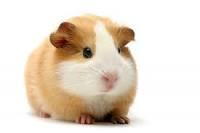Fun Facts about Guinea Pigs
- posted: Sep. 09, 2014
Squeeeak! Squeeaak! Is that the Refrigerator Door I Hear?
Fun Facts about Guinea Pigs
When I was in first grade, we had a guinea pig as a class pet that delivered three babies. My teacher asked any students who were allowed to have a one of the wee ones to put his or her name into a hat for a drawing. To my amazement (and to my mother’s chagrin), I was pulled as one of the lucky students who got to take home a pig of my very own! My little pig lived for 8 years and was a wonderful pet. Guinea pigs make great pets for kids (and adults!) as they are sturdy little creatures, tend to be good natured and rarely bite. They are relatively easy to care for and live an average of five to eight years.
 Guinea pigs are strict herbivores and are part of the rodent family originating from South America. Interestingly, guinea pigs cannot synthesize vitamin C and must be supplemented through their diet. If they do not receive enough vitamin C, they can develop scurvy just like the old-time sailors. Domesticated pigs can be supplemented with fresh citrus or other produce rich in vitamin C like kale, or by feeding commercial pellets within 90 days of purchase. Supplements to add to drinking water are also available.
Guinea pigs are strict herbivores and are part of the rodent family originating from South America. Interestingly, guinea pigs cannot synthesize vitamin C and must be supplemented through their diet. If they do not receive enough vitamin C, they can develop scurvy just like the old-time sailors. Domesticated pigs can be supplemented with fresh citrus or other produce rich in vitamin C like kale, or by feeding commercial pellets within 90 days of purchase. Supplements to add to drinking water are also available.
Guinea pigs are early bloomers and are sexually active at 2-3 months of age. Females should be bred before 7 months of age to reduce the chance of difficult birth caused by premature fusion or narrowing of the cartilage found between the two halves of the pelvis. This cartilage normally separates when the female is about to give birth. Sows are pregnant for 60-72 days and typically deliver 2-4 offspring. Baby guinea pigs are born with full fashionable fur coats, open eyes and can stand shortly after birth. Talk about your early achievers!
Common medical problems include pneumonia, bladder stones, and ovarian cysts. Some may have dental problems caused by mal-alignment of their continuously growing teeth. They can also be affected by mites, lice and fleas as well as the ringworm fungus. In addition, guinea pigs can succumb to heat stroke even in relatively comfortable temperatures to 75F. Keep those pigs cool!
Guinea pigs make a variety of cute whistles, purrs and grunts and will often squeal when someone opens the refrigerator! Speaking of refrigerators, while we think of guinea pigs as cuddly pets, people from Ecuador, Columbia and Peru use them for food! Not my cup of tea, but they are supposedly a good, sustainable food source in the Andes.
Believe it or not, there are thirteen recognized breeds of guinea pigs or cavies, some of which are the short-coated American, the “rosette” Abyssinian and the long haired Peruvian. There is also a cool breed called a Texel that has long curly locks. Check out the American Cavy Breeders Association website for a look at all the different breeds.
Most of the vets at Patton see guinea pigs, so if your piggy is having medical problems or if you have questions about caring for your pig, call Patton Veterinary Hospital for more information.
Location
Patton Veterinary Hospital
425 E Broadway
Red Lion, PA 17356
